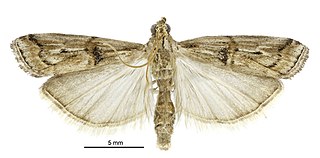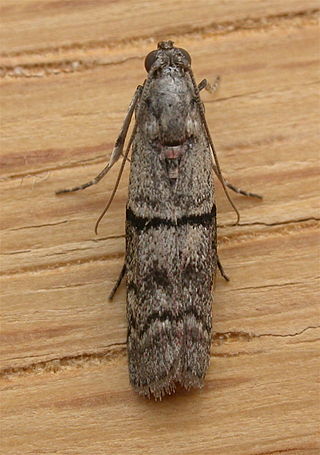
The Pyralidae, commonly called pyralid moths, snout moths or grass moths, are a family of Lepidoptera in the ditrysian superfamily Pyraloidea. In many classifications, the grass moths (Crambidae) are included in the Pyralidae as a subfamily, making the combined group one of the largest families in the Lepidoptera. The latest review by Eugene G. Munroe and Maria Alma Solis retain the Crambidae as a full family of Pyraloidea.

Rhodophaea is a genus of moth of the family Pyralidae described by Achille Guenée in 1845. It is found in most of Europe and in India.

Pempelia palumbella is a moth of the family Pyralidae. It is found in Europe.

Pempelia brephiella is a moth of the family Pyralidae. It is found in Southwestern Europe.

Pempelia genistella, the gorse colonial hard shoot moth, is a moth of the family Pyralidae. It is native to south-western Europe and north-western Africa, but has been introduced as a biological control agent for gorse in New Zealand and Hawaii.
Pempelia heringii, the pear fruit borer, is a moth of the family Pyralidae found in Japan and China and also reported from Hawaii. Two generations occur per year. Larvae have been reported feeding on apple, pear, and Chinese hawthorn. They feed inside young fruit and eject frass from the entry hole, causing visible damage.
Adanarsa is a monotypic snout moth genus in the subfamily Phycitinae. It was described by Carl Heinrich in 1956. It contains the species Adanarsa intransitella, which was originally described as Rhodophaea intransitella by Harrison Gray Dyar Jr. in 1905. It is found in North America, including Arizona, New Mexico and California.
Adelphia is a monotypic snout moth genus in the subfamily Phycitinae. It was described by Carl Heinrich in 1956. Its only species is Adelphia petrella, which was originally described as Pempelia petrella by Philipp Christoph Zeller in 1846. It is found in North America, from New Jersey to Florida and westward to Iowa and Texas.
Aurana is a genus of snout moths. It was erected by Francis Walker in 1863 and is known from Japan and Australia.

The Phycitini are a tribe of moths of the family Pyralidae.
Acrobasis persicella is a species of snout moth in the genus Acrobasis. It was described by Hans Georg Amsel in 1951. It is found in Iran.

Pempelia is a genus of moths of the family Pyralidae described by Jacob Hübner in 1825.
Pempelia albariella is a species of snout moth. It is found in Spain, France, Italy, Croatia, North Macedonia, Hungary, Slovakia, Romania, Ukraine, Russia and Kazakhstan.
Pempelia amoenella is a species of snout moth. It is found in Albania, North Macedonia, Greece, Romania, Croatia, Turkey, Kazakhstan and Mongolia.
Pempelia cirtensis is a species of snout moth. It is found on Cyprus, Turkey, Israel and North Africa, including Algeria.
Melathrix is a monotypic snout moth genus described by Émile Louis Ragonot in 1893. Its only species, Melathrix praetextella, was described by Hugo Theodor Christoph in 1877, originally under the genus Pempelia, but was subsequently moved to Melathrix by Ragonot. It is known from Turkmenistan.







